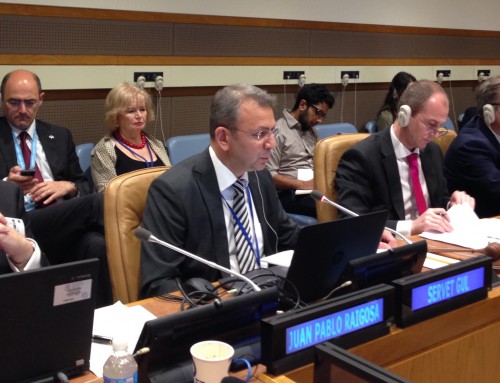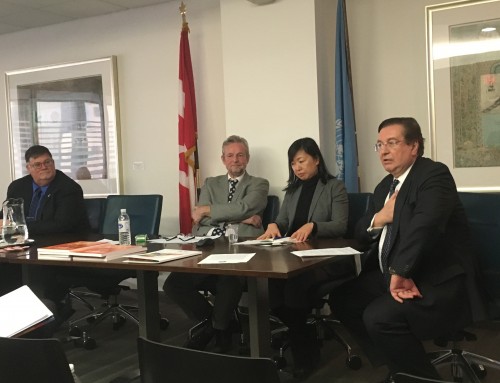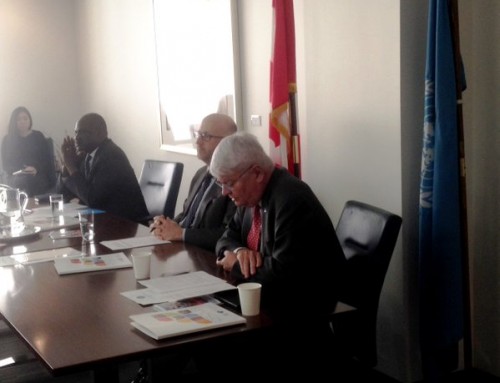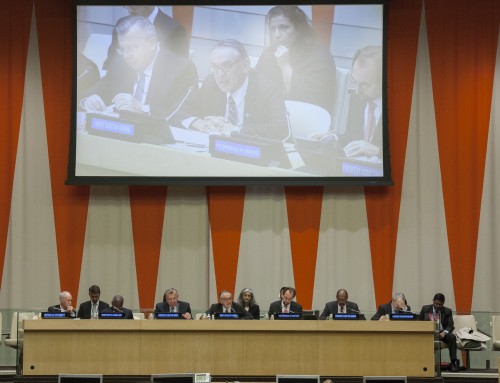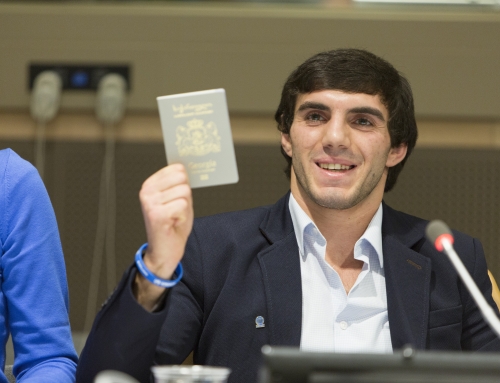The Permanent Missions of Finland and Tajikistan to the United Nations, and the Rule of Law Unit on behalf of the UN Rule of Law Coordination and Resource Group, hosted a discussion on “Sharing national practices: Ombudsman institutions – guardians of the rule of law”, that took place in New York on 13 May, 2016.
The event was opened by the Director of the Rule of Law Unit in the Executive Office of the Secretary-General. The panellists were the former Ombudsman for Minorities of Finland, and the Ombudsman of Tajikistan. The Deputy Director of the NGO Human Rights and Rule of Law in Tajikistan, as well as the Deputy to the Head of the New York Office of the High Commissioner for Human Right offered comments to the presentations. The event was moderated by UNDP, while the Ambassador of Finland to Tajikistan provided closing remarks.
The meeting provided an opportunity for sharing the experiences of Finland and Tajikistan with regard to their respective Ombudsman institutions, as well as on their mutual collaboration. Through UNDP as an implementing partner, Finland has provided support to the strengthening of the Ombudsman institution of Tajikistan, as part of the implementation of the voluntary pledge to support Central Asian states to strengthen the rule of law made by Finland on the occasion of the High Level Meeting of the General Assembly on the Rule of Law in 2012.
Mr. Edric Selous, Director of the Rule of Law Unit in the Executive Office of the Secretary-General, opened the event welcoming the opportunity to discuss the critical role of ombudsman institutions in safeguarding key principles of the rule of law, such as transparency, accountability and due process. He framed the event in the context of the request made by the General Assembly to the Secretary-General, to facilitate exchanges of information, knowledge and experiences on best national practices on the rule of law. He further recalled that with the occasion of the High-level meeting on the rule of law at the national and international levels, many States had made voluntary pledges to advance specific aspects of the rule of law according to their national contexts and priorities, mentioning how this event also provided an opportunity to share information on progress made in the implementation of those pledges.
Mr. Mikko Puumalainen, Deputy Chancellor of Justice and former Ombudsman for Minorities of Finland, explained the context in which a specialised Ombuds-instituion for minorities was created, and provided information on its functions, which include resolving complaints from citizens on breaches of the law by public officers, making inspections of public services at all levels, and undertaking initiatives concerning the delivery of services. He highlighted how the institutional flexibility that allowed the establishment of this specialized mandate focused on minorities, enhanced accountability and the promotion of the rights of this specific sector of the population. It was noted that the Office of the Ombudsman for Minorities of Finland has contributed to the strengthening of the principle of legality. This contribution has been possible, among other factors, due to the accessibility that citizens have to the Office (services are provided free of cost, procedures do not have formal requirements and its mandate is well known among the population); to the awareness of civil servants of the fact that citizens use this service to make complaints; and to the willingness of authorities to take into account the recommendations formulated by the Ombudsman as a result of complaints. Even though the Office has the power to present criminal charges against public servants, it was emphasised that its approach is more cooperative than punitive.
Mr. Zarif Alizoda, Ombudsman of Tajikistan, referred to the achievements and challenges of the establishment of an ombuds-institution for the first time in his country, highlighting the critical support provided by the UN and by other human rights institutions from Europe and Central Asia, as well as by the active engagement of civil society organizations. He provided details about the coalition against torture established by the Ombudsman with civil society organizations, which has included activities such as visits to prisons and pre-trial detention centres, as well as awareness raising and education activities for workers of detention centres. In the context of the project supported by Finland for the strengthening of the rule of law and human rights, the Ombudsman Office developed a national strategy for the period 2016 – 2020. The strategy includes a national plan for the implementation of the recommendations that have come out of the third review cycle under the Universal Periodic Review of the Human Rights Council. The cooperation with Finland is also addressing the implementation of recommendations that would allow the upgrading of the accreditation of the Ombuds-intitution from status B to status A, according to the Paris principles. Other examples of areas in which the Ombudsman has contributed to the protection of human rights, include the work undertaken to protect the rights of migrants who travel to Russia searching for job opportunities, and activities to promote awareness regarding entrepreneurial rights.
Ms. Tahmina Juraeva, from the NGO Human Rights and Rule of Law in Tajikistan, focused her intervention on the ways in which international cooperation and civil society have contributed to the establishment of the Ombudsman in her country. At the strategic level, civil society participated in the development of the Ombudsman’s strategy, as well as in the development of the methodology for dealing with complaints from citizens. At the programmatic level, her organization has been involved in the work undertaken by the Ombudsman to prevent torture in detention centres. She provided details on the activities that this collaboration has entailed, which include participating in surprise visits to detention centres and follow-up to the investigation of complaints. This cooperative work has increased the citizens’ trust in the Ombudsman and has also contributed to the protection of human rights, as illustrated by the fact that detention centres have generally complied with the recommendations made after the visits.
Ms. Maarit Kohonen-Sheriff, Deputy to the Head of the New York Office of the High Commissioner for Human Rights, emphasised the critical role of an independent Ombudsperson for a viable national human rights institution. Other elements that need to be present to effectively support a protection system include: laws in conformity with international human rights norms and standards; a government structure based on the separation of powers; mechanisms for the participation of civil society; and an independent media. Ms. Kohonen-Sheriff provided policy recommendations for the way forward: (i) to strive for the consolidation of one national human rights institution with the mandate to protect all human rights; (ii) to continue to work towards the achievement of accreditation for status A in order to ensure participation with Member States in international mechanisms; (iii) to support the Global Alliance in seeking the participation of A status national human rights institutions in New York; (iv) to further the strategic thinking on the role of national human rights institutions in supporting accountability for the implementation of SDGs.
In the interventions that followed, the Permanent Representative of Kazakhstan referred to the fruitful cooperation that has taken place in the region in support of ombuds-institutions. He noted that these partnerships were the result of their commitment to human rights and the rule of law.
In closing, the Ambassador of Finland to Tajikistan, H.E. Niklas Lindqvist, highlighted that the rule of law is a priority in his country’s social and foreign policies, as it is understood both as a key development goal in itself and as a means for the achievement of equality. A general conclusion drawn from the discussion was the critical role that civil society and international cooperation can play in the effective implementation of the mandates of Ombuds-institutions.


